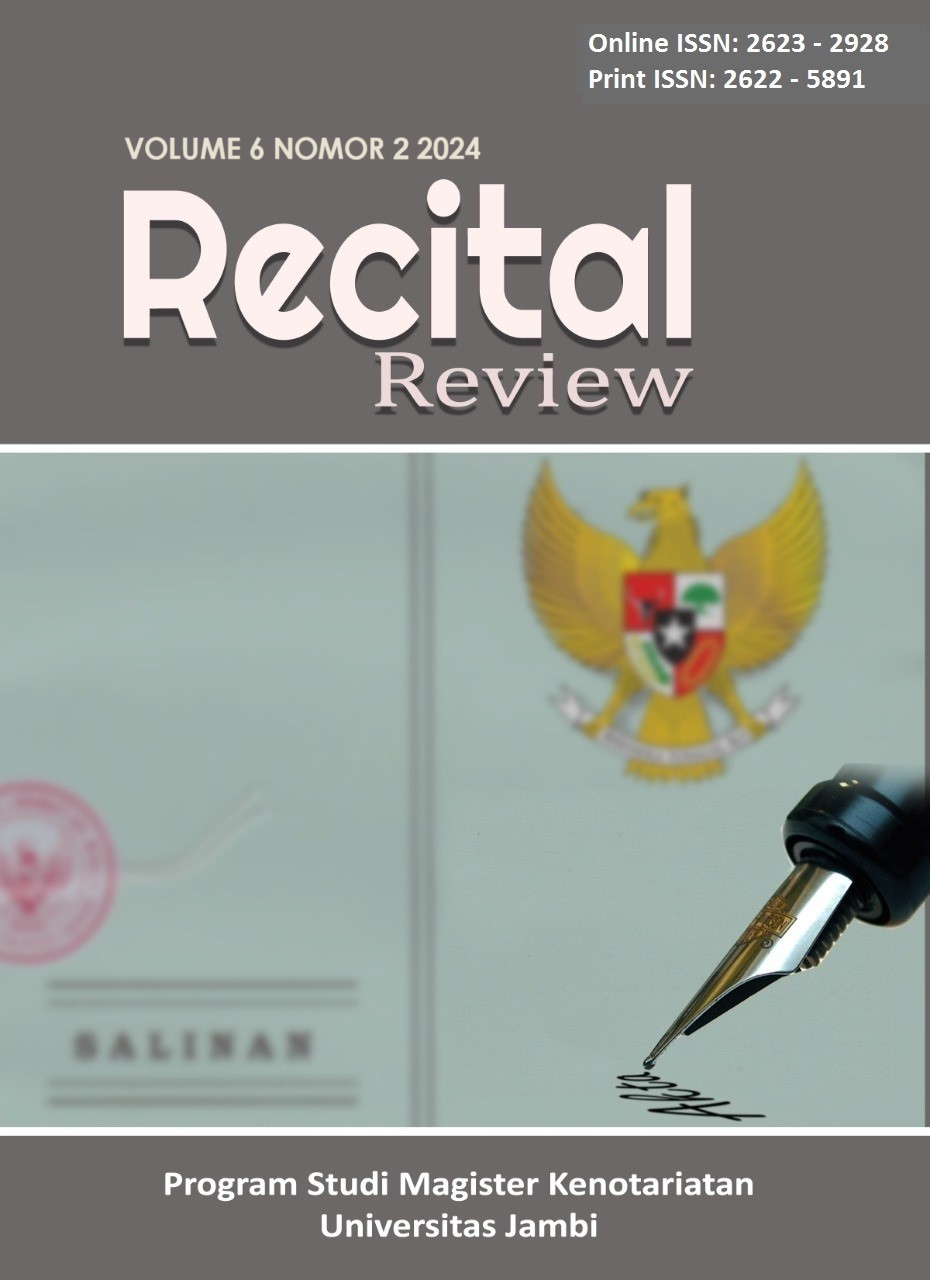Kepastian Hukum Penyelesaian Sengketa Gagal Bayar Debitur Pada Layanan Peer To Peer Lending Di Indonesia
DOI:
https://doi.org/10.22437/rr.v6i2.35112Keywords:
Peer To Peer Lending, Default, Dispute ResolutionAbstract
Peer to Peer lending is a form of online-based money lending service. P2P Lending has potential risks that can give rise to legal problems, namely the risk of default by the loan recipient. when the debtor default, the party who suffers the main loss is the lender. This type of thesis research uses the Normative Juridical method by taking a statutory approach and a conceptual approach. The results of the thesis research, legal certainty is achieved by using laws or regulations that are currently in effect, such as the Civil Code, Law no. 30 of 1999 concerning Arbitration and Alternative Dispute Resolution, OJK Regulation No. 10/POJK.05/2022. legal implications received by debtors who fail to pay on P2P Lending, the debtor receives a warning from the P2P Lending organizer, the debtor is subject to sanctions in the form of fines and interest charges that continue to increase, the debtor experiences collection by collectors, recorded on a blacklist by OJK. the dispute resolution option that can be taken by creditors together with P2P Lending providers who suffer losses due to debtors' failure to pay can be pursued through non-litigation and litigation dispute resolution.
Downloads
References
Debbi Puspito, Martin Roestamy, dan Edy Santoso, Model Perlindungan Hukum Bagi Kreditur Layanan Pinjam Meminjam Uang Berbasis Teknologi Informasi di Masa Pandemi Covid-19, Jurnal Living Law, Vol 14 No 1, 2022.
Dyah Ochtorina Susanti dan A’an Efendi, Penelitian Hukum (Legal Research), 2015, Jakarta: Sinar Grafika.
Firanda, Gika Asdina Pranangtyas, Paramita lestari, Sartika Nanda. Nagih utang (debt collector) pinjaman online berbasis financial technology. Diponegoro Law Journal, Vol. 8, No. 4, 2019.
Mamudji, Sri. Mediasi Sebagai Alternatif Penyelesaian Sengketa Di Luar Pengadilan. Jurnal Hukum Dan Pembangunan. Vol 34. No 3, 2017.
Meisya Andriani Lubis, Mohamad Fajri Mekka Putra, Peer To Peer (P2P) Lending: Hubungan Hukum Para Pihak, Gagal Bayar, Dan Legalitas, Jurnal USM Law Review, Vol 5 No 1, 2022.
Novendra, Bayu, Aulia Nisa, Sarah Safira. Konsep Dan Perbandingan Buy Now, Pay Later Dengan Kredit Perbankan Di Indonesia: Sebuah Keniscayaan Di Era Digital Dan Teknologi. Jurnal Rechts Vinding: Media Pembinaan Hukum Nasional, Vol. 9, No. 2, 2020.
Peter Mahmud Marzuki, 2010, Penelitian Hukum, Jakarta: Kencana.
Rizayusmanda, Budi Aspani, Bentuk Penyelesaian Hukum Wanprestasi Pada Perjanjian Pinjam Meminjam Secara Online, Jurnal Unpal, Vol. 20 No 3, 2022.
Said, Anggraini. Perlindungan Hukum Bagi Nasabah Yang Didaftarhitamkan Akibat Kesalahan Sistem Perbankan Menurut UU No. 10 Tahun 1998 Tentang Perbankan. Lex Crimen, Vol. 6, No. 3, 2017.
Satjipto Rahardjo, 2010, Ilmu Hukum, Yogyakarta: Citra Aditya.
Downloads
Published
How to Cite
Issue
Section
License
Copyright (c) 2024 Ramadhan Fahmi Budi Raharja

This work is licensed under a Creative Commons Attribution 4.0 International License.
The Authors(s) retain copyrights of the Article published on Recital Review. However, before publishing, it is required to obtain written confirmation from Author(s) in order to ensure the originality (Author Statement of Originality). The statement is to be signed by at least one of the authors who have obtained the assent of the co-author(s) where applicable. This work licensed under a Creative Commons Attribution 4.0 International License). All writings published in this journal are personal views of the authors and do not represent the views of this journal and the author's affiliated institutions.Â



